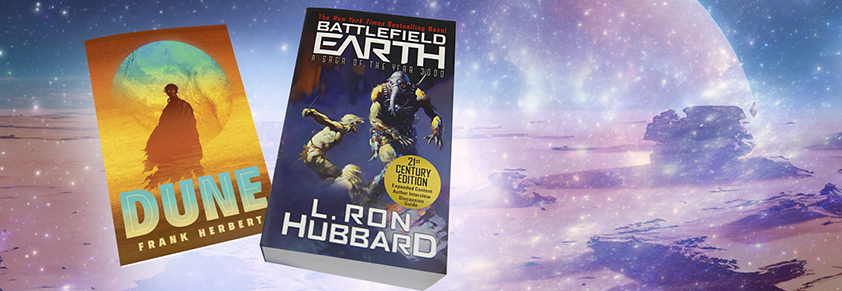What Do the Authors of Dune and Battlefield Earth Have in Common?
by John Goodwin
After watching the second installment of the Dune movie, I was struck by the similarities between Frank Herbert and L. Ron Hubbard. Both are often mentioned in the same context as creators of epics on par with the likes of the Foundation series. Curiosity led me to delve deeper into their lives and works, uncovering fascinating parallels. Here are some of the key similarities I’ve found:
1. Tacoma, Washington
Frank Patrick Herbert Jr. was born in Tacoma, Washington, on October 8, 1920. He spent much of his early life in the rural Olympic and Kitsap Peninsulas.
Similarly, L. Ron Hubbard’s early memories include “the awful abysses below the curling mountain roads of the Rockies” and “my uncle Bob’s coffee store in Tacoma,” where he joined Washington’s Troop 31 Black Eagle Boy Scout Patrol.
2. College Years
L. Ron Hubbard attended George Washington University, studying engineering and molecular physics while gaining national renown as a barnstormer and writer for The Sportsman Pilot.
Frank Herbert attended the University of Washington, but chose to follow his interests rather than a prescribed curriculum.
3. Journalism and Reporting
Both authors turned to journalism before becoming novelists. Hubbard worked as a freelance reporter-photographer for the Washington Herald, while Herbert wrote for the Seattle Star, the Oregon Statesman, and California Living magazine.
4. Early Writing Careers
They both got their start in the all-fiction magazines also known as the pulps.
L. Ron Hubbard’s first professional fiction sale was “The Green God,” published in Thrilling Adventures in 1934, while Frank Herbert’s first published science fiction story, “Looking for Something,” was published in Startling Stories in 1952.
5. The United States Navy
During World War II, both authors served in the US Navy. Herbert was a photographer for the Seabees (United States Naval Construction Battalions) but received a medical discharge after a head injury.
Hubbard served as a lieutenant in the Navy Reserve and dispatched to Australia to coordinate relief for beleaguered forces. Upon his return to the US, he assumed command of vessels in the Atlantic and Pacific and later recovered from war injuries at the Oak Knoll Naval Hospital.
6. Inspirations for their Epic Novels
Dune was inspired by Herbert’s fascination with the battle between man and nature in the rolling and moving dunes of the Oregon coast. Awestruck by the power of the blowing desert sand that threatened to bury buildings, roads, and railroad tracks, he originally planned to write an article. Instead, he dug deeper into desert ecosystems and human interactions with nature, which became the centerpiece for Dune and the alien desert planet, Arrakis.
Battlefield Earth was inspired by the author’s observation of human interactions with our planet. He stated, “We think nothing of going into an area and taking out minerals at the expense of the plant and animal life. So what would it be like if an advanced race of aliens viewed the entire planet of Earth in the same way?” The story prominently features Denver and the Rocky Mountains as central elements of the plot, areas in which Ron Hubbard had spent many happy times.
Both authors convey the perils of exploiting planets and their natural resources. Arrakis is being mined to death in Dune. Earth is being mined to death in Battlefield Earth.
7. Paying It Forward
Both authors also shared a deep love for science fiction and fantasy and understood the challenges faced by emerging writers. Hubbard founded the Writers of the Future Contest in 1983 to give new writers visibility with these words:
“A culture is as rich and as capable of surviving as it has imaginative artists. The artist is looked upon to start things. The artist injects the spirit of life into a culture….
“In these modern times, there are many communication lines for works of art. Because a few works of art can be shown so easily to so many, there may even be a fewer artists. The competition is very keen and even dagger sharp.
“It is with this in mind that I initiated a means for new and budding writers to have a chance for their creative efforts to be seen and acknowledged.”
Herbert supported the Contest as a judge and emphasized the importance of established writers mentoring newcomers. His last published piece, written shortly before he passed away for Writers of the Future Volume 2, ends with:
“I’d also like to say something about older hands helping newcomers. Like many other established writers, I teach students on frequent occasions and lecture to many other audiences anxious for advice on writing. I’m very happy to be able to lend my help to the Writers of the Future program. From time to time, though, people have come up to me and asked why I want to ‘create competition’ by helping newcomers.
“Talking about ‘competition’ in that way is nonsense! The more good writers there are, the more good readers there will be. We’ll all benefit—writers and readers alike!
“So the other piece of advice I have for newcomers is: ‘Remember how you learned, and when your turn comes, teach.’”
Frank Herbert and L. Ron Hubbard were legendary writers who valued the essence of storytelling over strict adherence to grammatical rules. Their legacies include not only their monumental works but also their efforts to support and inspire future generations of writers.



Leave a Reply
Want to join the discussion?Feel free to contribute!